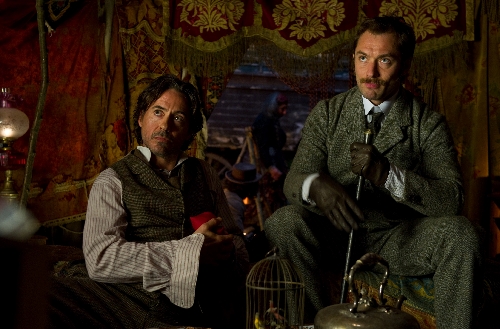Sherlock Holmes more interested in martial arts than sleuthing in ‘Game of Shadows’

What’s in a name?
When the name is "Sherlock Holmes: A Game of Shadows," the answer to that question is, not surprisingly, more of the same.
Fans of 2009’s "Sherlock Holmes" will, no doubt, greet this sequel with jubilant hosannas.
Alas, I can’t count myself among them.
You see, I have known, and loved, Sir Arthur Conan Doyle’s Sherlock Holmes since my beloved Uncle Jody gave me "The Complete Sherlock Holmes" — all four novels and 56 adventures — for my 10th birthday. (I celebrated my 57th birthday last week, so you know how long I’ve been a devotee.)
And the smirky, insouciant Holmes who returns in "A Game of Shadows" — embodied once again by Robert Downey Jr. — bears frustratingly limited resemblance to Doyle’s indelible literary creation.
Oh, he has his moments, to be sure. And many of those who know only Holmes’ name, and fame, from these movies may find his action-packed adventures wildly diverting.
But it’s as if somebody decided to make a Tarzan movie and outfitted the title character in a tutu before sending him tooling around the jungle on a Harley.
In short, I fail to see the point of making a movie about an established literary character that trashes its inspiration so thoroughly.
Perhaps if I liked the movie better, I wouldn’t mind (so much) the liberties it takes with Sherlock Holmes or his Victorian-era environs. But I doubt it.
The "Pirates of the Caribbean" folks had a much better approach: borrow the trappings of past pirate adventures, then create a new hero to romp about as he (and they) pleased.
Yet even those who adore Downey’s Holmes may find the movie’s cat-and-rat games too convoluted to bother following.
Which seems perfectly acceptable, considering how little interest the filmmakers have in constructing a coherent storyline in the first place.
At least they have a better villain this time around: that nefarious "Napoleon of Crime," Professor James Moriarty (smilingly arrogant Jared Harris), a distinguished Oxford mathematician whose mind is at least as facile as Holmes’ own.
Having infiltrated high government circles, the well-connected Moriarty is busy behind the scenes, stirring up trouble all across Europe with the eager, if unwitting, assistance of assorted anarchists and revolutionaries.
Meanwhile, back in 1891 London, Holmes has a more pressing concern: distracting his faithful companion Dr. John Watson (Jude Law) from his rapidly approaching marriage to the fetching Mary (a feisty Kelly Reilly).
Indeed, the bromantic banter between Holmes and Watson — and the lengths to which Holmes will go to drag Watson on one last adventure — assume (too) much importance as director Guy Ritchie cranks "Game of Shadows" into gear.
Then again, that’s what audiences have come to see.
Forget about tracking suspects or analyzing clues or any of that other deductive-reasoning detective nonsense that Doyle’s Holmes used to practice so expertly; this Holmes prefers to demonstrate his martial-arts prowess, play master of disguise in a succession of humorously outlandish costumes and conduct avant-garde scientific experiments, at least one of which is destined to influence the denizens of "Pulp Fiction" a century later. (Such is life in the movie-centric universe this Holmes inhabits.)
Eventually, as it must, the game finally gets afoot, embroiling Holmes and Watson with enigmatic gypsy Simza Heron (Noomi Rapace , star of the original Swedish "Girl With the Dragon Tattoo" and its sequels), who’s searching for her rabble-rousing revolutionary of a brother. Who just might be connected to Moriarty and his sharp-shooting chief enforcer, Col. Sebastian Moran (British TV veteran Paul Anderson).
Speaking of brothers, Holmes’ brainy brother Mycroft (the delightfully deadpan Stephen Fry) reappears to advise the dynamic Holmes-Watson duo as they globe-trot from London to Paris and beyond, trading quips and dodging bullets (along with much higher-caliber weaponry) while Ritchie and screenwriters Kieran and Michele Mulroney put them through their paces.
True to form, Ritchie punctuates the proceedings with rapid-fire, slice-and-dice action, concentrating on deploying maximum special-effects firepower while Downey and Law trade rapid-fire ripostes en route to the final confrontation between Holmes and Moriarty.
That climax includes some at-long-last mental gymnastics that prove how well-matched these adversaries truly are — or would be, if the rest of the movie had bothered to focus on their eventual clash-of-the-titans showdown.
But that would be too much like Conan Doyle’s original Sherlock Holmes for comfort.
As "Game of Shadows" makes all too clear, that Holmes isn’t the guy this movie’s about — more’s the pity.
Contact movie critic Carol Cling at ccling@reviewjournal.com or 702-383-0272.